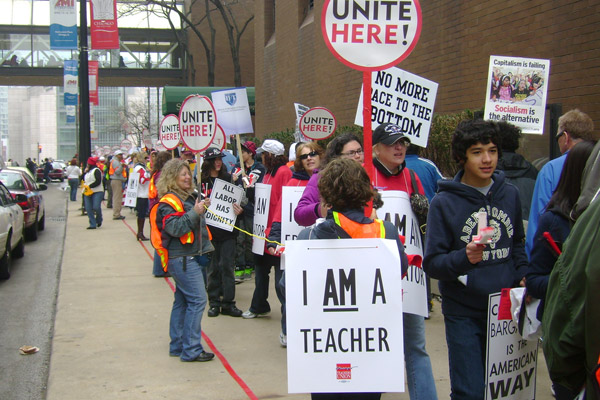
In discussing the Sun-Times report on CPS leadership raises—which, it should be noted, comes almost exactly a year after Ben Joravsky found the same thing under Ron Huberman—Steve Rhodes writes:
"How anyone can take raises in this environment is beyond me."
That’s one way of looking at it. Another way is this: it makes total sense that management would take raises in this environment. It all depends on what you mean by "this environment."
If you mean the environment of the deficit-laden Chicago Public Schools, and the recinded four-percent raise for teachers, no, maybe it doesn’t make a great deal of sense.
If you mean the broader American economic environment, then it’s totally explicable.
Peter Whoriskey, writing about a study by economists Jon Bakija, Adam Cole and Bradley T. Heim, is a good introduction to what’s been going on in the past few decades with regards to income in America, putting specific numbers to the obvious:
Now a mounting body of economic research indicates that the rise in pay for company executives is a critical feature in the widening income gap.
The largest single chunk of the highest-income earners, it turns out, are executives and other managers in firms, according to a landmark analysis of tax returns by economists Jon Bakija, Adam Cole and Bradley T. Heim. These are not just executives from Wall Street, either, but from companies in even relatively mundane fields such as the milk business.
It’s more than "not just" executives from Wall Street, or finance in general: the three economists found that 41 percent of the top 0.1 percent of American wage earners—earning more than $1.7 million a year individually, and more than 10 percent of all the nation’s personal income—are managers or executives in non-financial firms.
Obviously the leadership of CPS isn’t in the top 0.1 percent. They’re not even in the top one percent, which starts at about $380k and receives 20 percent of the nation’s personal income. But they are managers of large organizations, so it’s unsurprising that there would be upward pull on the public-sector equivalent.
It’s really a remarkable phenomenon, and one I only dimly understand. One thing Whoriskey points out, and that’s underlined by the Tax Foundation’s 2010 analysis of income brackets, is that stock and options make up a large part of spiraling executive compensation.
A second, that Whoriskey only hints at, is that income inequality seems to be more culturally acceptable than it was decades ago. That’s something of a mystery, but a good place to start is a truly slept-on financial-crisis-era book, Liquidated: An Ethnography of Finance. It’s by a former financial worker, Karen Ho, who left the industry to study anthropology, then returned to it to complete her studies. Among her findings is that young financial professionals are acculturated to high incomes beginning with the college recruitment process, in which students are seduced less by the raw numbers than the idea that they represent their worth as thinkers and doers. (I observed the process at my financial-hotbed of an alma mater—from the outside, as an English major—and recall econ majors discussing the models of cars they were going to buy in their first year out of undergrad, which cost more than I knew I was going to make in a year. Which made sense for them: if you’re a single 23-year-old making $150k, why not buy a $50k car?)
But that’s not really getting to Rhodes’s (implied) question. He didn’t ask why they’d get the raises; he asked why they’d take them. Well, it’s a pretty well-established psychoeconomic fact that people don’t really—or at least instinctually—value income so much based on what it can do than how it compares to other people’s incomes.
So let’s take CPS. It has over 40,000 employees (about half of whom are teachers). It’s the second-biggest employer in the city. The biggest private employer in the city with a comparable number of total employees, meanwhile, is Allstate, which employs about 33,000 people worldwide. Its CEO, Thomas Wilson II—a Northwestern MBA—made $2.92 million in 2009, one million of which was base salary. His 2009 CEO compensation rank, according to Forbes? 371st, 17th in the insurance industry.
Put yourself in Jean-Claude Brizard’s shoes for a moment. Would you think, "hey, it’s weird that I’m probably going to make eight percent more than my predecessor," or "actually, it’s more weird that a guy who manages a considerably smaller organization than I do, with arguably less social value, makes more ten times what I do?"
(Actually, my young little familial unit just voluntarily took a massive pay cut, more than 50% of our income. It’s a long story, but I understand, first hand, how difficult a decision it is. One thing that I will admit ran through my mind: we should just make as much money as possible RIGHT NOW because Medicare might be gone in 35 years, and end-of-life care is hell of expensive. I’m 30, by the way. If you haven’t done it, you’d be surprised at how hard it is to give up money, for whatever reason. It was not a vow of poverty, but given the economy and the fraying of the social safety net, taking a vow of middle-class-ness is at least enough to provoke somewhat irrational fears… or are they irrational?)
None of which is to say that the salaries are right, either strategically or morally. I’d be very interested to see a major school district announce that they’re not paying a dime over, say, $150k, just to see what would happen. Even $100k! It would be an interesting challenge. But not only do I think I understand why the raises would be offered, and why they would be taken, I think they’re part of a much, much larger phenomenon that’s a much more difficult problem.
Photograph: Jean Paul Holmes (CC by 2.0)


